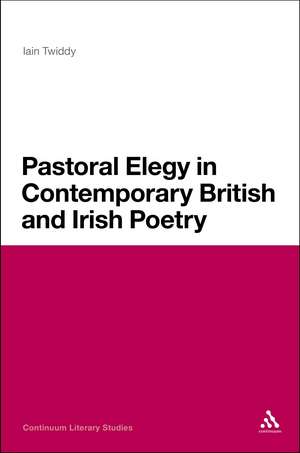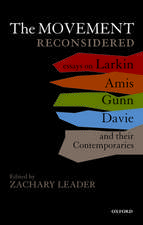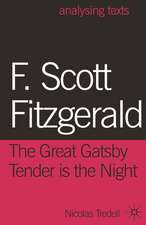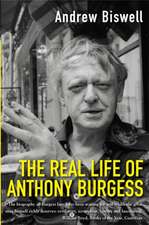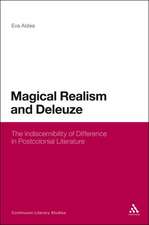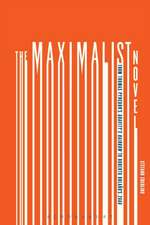Pastoral Elegy in Contemporary British and Irish Poetry: Continuum Literary Studies
Autor Iain Twiddyen Limba Engleză Hardback – 14 mar 2012
As Twiddy outlines the development of the form, he identifies its characteristics and functions. But more importantly his study accounts for the enduring appeal of the pastoral elegy, why poets look to its conventions during times of personal distress and social disharmony, and how it allows them to recover from grief, loss and destruction.
Informed by current debates and contemporary theories of mourning, Twiddy discusses themes of war and peace, social pastoral and environmental change, draws on the enduring influence of both Classical and Romantic poetics and explores poets' changing relationships with pastoral elegy throughout their careers. The result is a study that demonstrates why the pastoral elegy is still a flourishing and dynamic form in contemporary British and Irish poetry.
| Toate formatele și edițiile | Preț | Express |
|---|---|---|
| Paperback (1) | 258.59 lei 43-57 zile | |
| Bloomsbury Publishing – 20 noi 2013 | 258.59 lei 43-57 zile | |
| Hardback (1) | 775.02 lei 43-57 zile | |
| Bloomsbury Publishing – 14 mar 2012 | 775.02 lei 43-57 zile |
Din seria Continuum Literary Studies
- 31%
 Preț: 889.23 lei
Preț: 889.23 lei -
 Preț: 257.03 lei
Preț: 257.03 lei - 23%
 Preț: 255.84 lei
Preț: 255.84 lei - 30%
 Preț: 773.65 lei
Preț: 773.65 lei - 23%
 Preț: 255.76 lei
Preț: 255.76 lei - 22%
 Preț: 889.49 lei
Preț: 889.49 lei - 22%
 Preț: 773.39 lei
Preț: 773.39 lei - 22%
 Preț: 889.49 lei
Preț: 889.49 lei - 13%
 Preț: 256.20 lei
Preț: 256.20 lei - 23%
 Preț: 255.76 lei
Preț: 255.76 lei - 31%
 Preț: 891.51 lei
Preț: 891.51 lei - 22%
 Preț: 889.55 lei
Preț: 889.55 lei - 31%
 Preț: 889.49 lei
Preț: 889.49 lei - 22%
 Preț: 772.65 lei
Preț: 772.65 lei - 22%
 Preț: 889.15 lei
Preț: 889.15 lei - 14%
 Preț: 771.84 lei
Preț: 771.84 lei - 22%
 Preț: 888.50 lei
Preț: 888.50 lei - 22%
 Preț: 772.98 lei
Preț: 772.98 lei - 30%
 Preț: 595.82 lei
Preț: 595.82 lei - 13%
 Preț: 258.59 lei
Preț: 258.59 lei - 22%
 Preț: 889.88 lei
Preț: 889.88 lei - 22%
 Preț: 256.29 lei
Preț: 256.29 lei - 14%
 Preț: 652.81 lei
Preț: 652.81 lei - 31%
 Preț: 889.49 lei
Preț: 889.49 lei - 23%
 Preț: 255.76 lei
Preț: 255.76 lei - 14%
 Preț: 772.17 lei
Preț: 772.17 lei - 22%
 Preț: 888.81 lei
Preț: 888.81 lei - 31%
 Preț: 771.59 lei
Preț: 771.59 lei - 22%
 Preț: 898.95 lei
Preț: 898.95 lei - 23%
 Preț: 256.02 lei
Preț: 256.02 lei - 31%
 Preț: 889.88 lei
Preț: 889.88 lei - 22%
 Preț: 256.59 lei
Preț: 256.59 lei - 22%
 Preț: 886.21 lei
Preț: 886.21 lei - 31%
 Preț: 772.58 lei
Preț: 772.58 lei - 31%
 Preț: 889.08 lei
Preț: 889.08 lei - 30%
 Preț: 774.46 lei
Preț: 774.46 lei - 31%
 Preț: 889.97 lei
Preț: 889.97 lei - 23%
 Preț: 254.84 lei
Preț: 254.84 lei - 28%
 Preț: 373.89 lei
Preț: 373.89 lei - 30%
 Preț: 774.20 lei
Preț: 774.20 lei - 31%
 Preț: 888.50 lei
Preț: 888.50 lei - 22%
 Preț: 889.63 lei
Preț: 889.63 lei - 31%
 Preț: 890.14 lei
Preț: 890.14 lei - 22%
 Preț: 888.50 lei
Preț: 888.50 lei - 22%
 Preț: 888.65 lei
Preț: 888.65 lei - 23%
 Preț: 262.25 lei
Preț: 262.25 lei
Preț: 775.02 lei
Preț vechi: 1113.65 lei
-30% Nou
Puncte Express: 1163
Preț estimativ în valută:
148.35€ • 161.19$ • 124.69£
148.35€ • 161.19$ • 124.69£
Carte tipărită la comandă
Livrare economică 21 aprilie-05 mai
Preluare comenzi: 021 569.72.76
Specificații
ISBN-13: 9781441139412
ISBN-10: 1441139419
Pagini: 304
Ilustrații: black & white illustrations
Dimensiuni: 156 x 234 x 18 mm
Greutate: 0.59 kg
Ediția:New.
Editura: Bloomsbury Publishing
Colecția Continuum
Seria Continuum Literary Studies
Locul publicării:London, United Kingdom
ISBN-10: 1441139419
Pagini: 304
Ilustrații: black & white illustrations
Dimensiuni: 156 x 234 x 18 mm
Greutate: 0.59 kg
Ediția:New.
Editura: Bloomsbury Publishing
Colecția Continuum
Seria Continuum Literary Studies
Locul publicării:London, United Kingdom
Caracteristici
Psychoanalytic and eco-poetic models inform close readings of Hughes, Heaney and Muldoon.
Notă biografică
Iain Twiddy is Associate Professor of English in the Faculty of Media and Communication at Hokkaido University, Japan.
Cuprins
Introduction: Contemporary Pastoral Elegy \ 1. Inheritance and Commemoration: Memorial Landscapes in Michael Longley's Poetry \ 2. Community Poetry 1: Pastoral Elegy in Ted Hughes' Remains of Elmet , Moortown Diary and River \ 3. Community Poetry 2: Pastoral Elegy in Ted Hughes' Birthday Letters \ 4. Leaving Home: Seamus Heaney's Parental Elegies \ 5. Pastoral and Aftermath: Seamus Heaney \ 6. 'Routine Periodic Faunal Extinctions': Peter Reading's Ecological Elegies \ 7. Contemporary Female Poets and Pastoral Elegy \ 8. Grief Brought to Numbers: Paul Muldoon's Circular Elegies \ 9. The Ethics of Pastoral Elegy: Douglas Dunn and Christopher Reid \ Conclusion: The Future of Pastoral Elegy \ Bibliography \ Index
Recenzii
[I]ndividual sections offer solid close readings and interesting insights not only into the works of the respective poets but into the variability of pastoral and the elegy.
'Iain Twiddy is a wonderfully acute reader with a deep understanding ot the historical and psycholological roots of pastoral elegy. The result is a compelling account of the adaptability and continuing vitality of the genre.'
'Iain Twiddy's inspiring account of contemporary poetry pays tribute to the resilience and persistence of one of the oldest forms of writing - the pastoral elegy. In this highly informative and comprehensive study, he ranges from the classical origins of pastoral elegy to its modern manifestations in the writings of Michael Longley, Ted Hughes, Seamus Heaney, Paul Muldoon, and others. He shows with impressive conviction how contemporary poets have continued to draw on the energies and resources of pastoral elegy in confronting loss and adjusting to social and political change. The versions of pastoral we encounter in this compelling book are poems that are dynamically involved in the traditional elegiac processes of memory and consolation, but also fully alert to the challenges of their own time, including the devastation of war and the impact of environmental change. The book finds hope and uplift in the revitalised forms of pastoral elegy in contemporary British and Irish poetry. In its meticulously detailed attention to language and form, it shows (in the words of Wallace Stevens) how each poem is "the cry of its occasion".'
'Iain Twiddy is a wonderfully acute reader with a deep understanding ot the historical and psycholological roots of pastoral elegy. The result is a compelling account of the adaptability and continuing vitality of the genre.'
'Iain Twiddy's inspiring account of contemporary poetry pays tribute to the resilience and persistence of one of the oldest forms of writing - the pastoral elegy. In this highly informative and comprehensive study, he ranges from the classical origins of pastoral elegy to its modern manifestations in the writings of Michael Longley, Ted Hughes, Seamus Heaney, Paul Muldoon, and others. He shows with impressive conviction how contemporary poets have continued to draw on the energies and resources of pastoral elegy in confronting loss and adjusting to social and political change. The versions of pastoral we encounter in this compelling book are poems that are dynamically involved in the traditional elegiac processes of memory and consolation, but also fully alert to the challenges of their own time, including the devastation of war and the impact of environmental change. The book finds hope and uplift in the revitalised forms of pastoral elegy in contemporary British and Irish poetry. In its meticulously detailed attention to language and form, it shows (in the words of Wallace Stevens) how each poem is "the cry of its occasion".'
